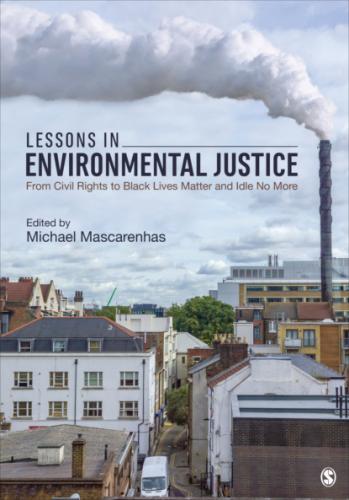Lessons in Environmental Justice. Группа авторов
on>
Lessons in Environmental Justice
From Civil Rights to Black Lives Matterand Idle No More
Michael Mascarenhas
University of California, Berkeley
Los Angeles
London
New Delhi
Singapore
Washington DC
Melbourne
Copyright © 2021 by SAGE Publications, Inc.
All rights reserved. Except as permitted by U.S. copyright law, no part of this work may be reproduced or distributed in any form or by any means, or stored in a database or retrieval system, without permission in writing from the publisher.
All third-party trademarks referenced or depicted herein are included solely for the purpose of illustration and are the property of their respective owners. Reference to these trademarks in no way indicates any relationship with, or endorsement by, the trademark owner.
FOR INFORMATION:
SAGE Publications, Inc.
2455 Teller Road
Thousand Oaks, California 91320
E-mail: [email protected]
SAGE Publications Ltd.
1 Oliver’s Yard
55 City Road
London, EC1Y 1SP
United Kingdom
SAGE Publications India Pvt. Ltd.
B 1/I 1 Mohan Cooperative Industrial Area
Mathura Road, New Delhi 110 044
India
SAGE Publications Asia-Pacific Pte. Ltd.
18 Cross Street #10-10/11/12
China Square Central
Singapore 048423
ISBN 978-1-5443-2195-0
Printed in the United States of America
Acquisitions Editor: Jeff Lasser
Editorial Assistant: Tiara Bennett
Production Editor: Olivia Weber-Stenis
Copy Editor: Amy Marks
Typesetter: Diacritech
Proofreader: Alison Syring
Indexer: Diacritech
Cover Designer: Candice Harman
Marketing Manager: Rob Bloom
Preface
As a first-generation college graduate—the only person in my entire extended family to graduate with a doctoral degree—and a person of color, born in the United Kingdom of refugees from South Asia, and then an immigrant and eventual citizen of Canada, and now the United States, I am intimately familiar with the experiences, challenges, and biases faced by the poor, immigrants, and people of color in Canada and the United States, where I currently reside. I have lived with displacement, poverty, and racism my entire life. As a student and later a faculty member, I have witnessed place, race, ethnic, class, gender, and able bias; lack of adequate representation of diverse backgrounds and perspectives; and other institutional variables (for example, lack of support networks and lack of diversity in leadership) that have led many students and faculty to question their existence in the academy, drop out, and leave. This intransigence of the academy has been hard to watch, but it has inspired me, through various research, teaching, and service activities and approaches, to make the academy a more diverse, fair, equitable, and inclusive place.
For me this book project marks a turning point for thinking more deeply about environmental justice and environmental racism. Its consequence is, in part, the outcome of my frustration with academia to theorize environmental injustice and environmental racism in a more meaningful way. The book is directed at undergraduate students. Many of them, like me, have experienced multiple forms of environmental injustice and environmental racism but struggle to make sense of what they are experiencing. This book is an effort to help them understand that they are not alone. This book is also directed at those who come from privileged environs, to help them understand that racism is so much more than intentional and hostile acts. As this book articulates, it is also rooted in white supremacy, white privilege, and institutional racism. I am deeply indebted to the authors who contributed to this pedagogical intervention. Their response to my poorly written outline was encouraging. And I am thrilled to write that the book is so much more than I imagined. I am sure you will agree.
Acknowledgments
This book project would not have been possible without the extensive editorial oversight of Dr. Kelly Grindstaff, at the Lawrence Hall of Science, UC Berkeley. In addition to working with each author, she conceptualized many of the chapter teaching activities, drawing on her experience teaching Environment and Society, and Environment and Politics, as well as researching STEM and multicultural education. Her pedagogical contribution and creative insight is all over this book.
SAGE would also like to acknowledge the following reviewers:
Benjamin C. Brown, University of New Hampshire
Kishi Animashaun Ducre, Syracuse University
Penn Loh, Tufts University
Jonathan London, University of California, Davis
Kari Marie Norgaard, University of Oregon
Dianne Quigley, Brown University
About the Editor
Michael Mascarenhasis a first-generation college graduate, anti-colonialist, anti-racism comrade. Professor Mascarenhas’s scholarship examines the interconnections between contemporary neoliberal reforms, environmental change, and environmental justice and racism. This interdisciplinary body of research brings together concepts from critical race theory and environmental studies to help cultivate knowledge that contributes to political activism and coalition politics. Mascarenhas is an associate professor in the Department of Environmental Science, Policy, and Management at the University of California, Berkeley. He is the author of Where the Waters Divide: Neoliberalism, White Privilege, and Environmental Racism in Canada (2012) and New Humanitarianism and the Crisis of Charity: Good Intentions on the Road to Help (2107). He was an expert witness at the Michigan Civil Rights Commission on the Flint water crisis and an invited speaker to the National Academies of Sciences, Engineering, and Medicine’s Committee on Designing Citizen Science to Support Science Learning.
About the Contributors
Julian Agyemanis a professor of urban and environmental policy and planning at Tufts University. He is the originator of the concept of “just sustainabilities,” the intentional integration of social justice and sustainability. He is the author or editor of 12 books, including Just Sustainabilities: Development in an Unequal World (2003) and Sharing Cities: A Case for Truly Smart and Sustainable Cities (2015). He is editor-in-chief of Local Environment: The International Journal of Justice and Sustainability; series editor of Just Sustainabilities: Policy, Planning, and Practice; and co-editor of the Routledge Equity, Justice and the Sustainable City series. In 2018, he was awarded the Athena City Accolade by KTH Royal Institute of Technology, Stockholm, for his “outstanding contribution to the
